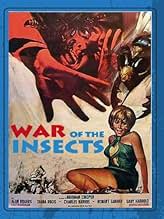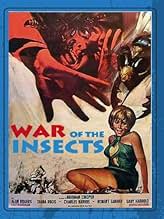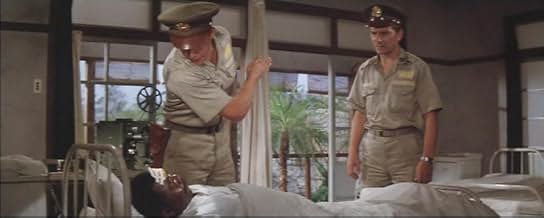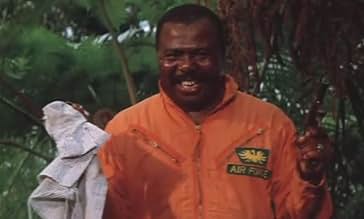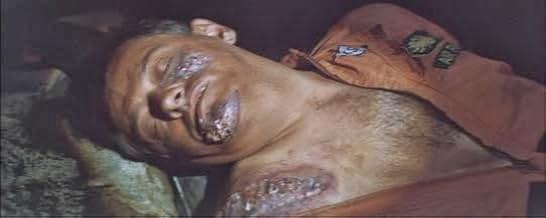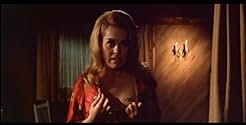All the insects on Earth become wild and attack humans, causing Armageddon.All the insects on Earth become wild and attack humans, causing Armageddon.All the insects on Earth become wild and attack humans, causing Armageddon.
Ralph Jesser
- Lieutenant Gordon
- (as Rolf Jesser)
Mike Danning
- Aircraft Captain
- (as Mike Daneen)
- Director
- Writers
- All cast & crew
- Production, box office & more at IMDbPro
Featured reviews
All the insects on Earth become wild and attack humans, causing Armageddon.
The film's staff includes Shizuo Hirase as the cinematographer, who also worked on the Shochiku films "The X from Outer Space" and "Goke, Body Snatcher from Hell". Composer Shunsuke Kikuchi, who also worked on "Goke", does the music here; he may be best known today for "Female Convict Scorpion" or perhaps "Dragon Ball Z".
Because this was the last horror film Shochiku would produce, it is suitably ambitious and apocalyptic. This is dark, bleak, and edgy beyond what we typically see from horror of the era, especially in Japan. We (at least Americans) expect men in rubber suits to beat on each other, but this is a far worse menace!
The film's staff includes Shizuo Hirase as the cinematographer, who also worked on the Shochiku films "The X from Outer Space" and "Goke, Body Snatcher from Hell". Composer Shunsuke Kikuchi, who also worked on "Goke", does the music here; he may be best known today for "Female Convict Scorpion" or perhaps "Dragon Ball Z".
Because this was the last horror film Shochiku would produce, it is suitably ambitious and apocalyptic. This is dark, bleak, and edgy beyond what we typically see from horror of the era, especially in Japan. We (at least Americans) expect men in rubber suits to beat on each other, but this is a far worse menace!
Genocide (1968) is a movie that I recently watched on a random streaming service. The storyline follows a young lady who recently became pregnant and is planning to have an abortion when an insect outbreak occurs. All life becomes at risk as no one knows how to stop the bugs. A diabolical plan to take over the world becomes apparent and will anyone be able to stop the mastermind behind the plot?
This movie is directed by Kazui Nihonmatsu (The X from Outer Space) and stars Eiji Okada (Woman in the Dunes), Hiroshi Fujioka (Kamen Rider), Ryûji Kita (King Kong Escapes) and Reiko Mutô (Arcadia of My Youth).
This is one of those "almost good" movies that had all the ingredients to be fun but somehow falls short. The film starts with a fun model burning airplane crash scene that made me smile. The sets, settings and characters were fun. The villain was a smoking hot blond with a few screws loose...but somehow all the pieces of the puzzle weren't put together well. The storyline was a bit stale, slow and didn't have enough kills for me to get excited. The ending was cool and worked for me.
Overall this is a very average addition to the horror genre that's still a fun watch. I would score this a 4.5-5/10 and only recommend watching it if nothing better is available.
This movie is directed by Kazui Nihonmatsu (The X from Outer Space) and stars Eiji Okada (Woman in the Dunes), Hiroshi Fujioka (Kamen Rider), Ryûji Kita (King Kong Escapes) and Reiko Mutô (Arcadia of My Youth).
This is one of those "almost good" movies that had all the ingredients to be fun but somehow falls short. The film starts with a fun model burning airplane crash scene that made me smile. The sets, settings and characters were fun. The villain was a smoking hot blond with a few screws loose...but somehow all the pieces of the puzzle weren't put together well. The storyline was a bit stale, slow and didn't have enough kills for me to get excited. The ending was cool and worked for me.
Overall this is a very average addition to the horror genre that's still a fun watch. I would score this a 4.5-5/10 and only recommend watching it if nothing better is available.
Let's not beat around the bush: this is a mess. It's not all bad, but a bounty of good ideas are fumbled terribly in too many ways. We do get the variation on "nature run amok" genre cinema that is promised by the very name of 'War on the insects,' and the alternate name 'Genocide,' but this is delayed, sidelined, and scarcely more than alluded to for a majority of the runtime, only slowly becoming more central in the latter half. This might be fine if the storytelling at large were strong and compelling, but the thriller-orientated human drama that defines the preponderance is garbled and scattered, with all its very workable notions being treated questionably if not outright poorly. To wit: a U. S. Air Force bomber, a murder investigation, and the suspect's expecting wife; U. S. airmen, Soviet spies, the Cold War, and hatred of war and humans; and to top it all off, nihilist, misanthropic biological warfare, experimentation, and eco-terrorist supremacy. Amada Kingen penned a fine story with engaging thoughts, admirable themes, and bleak despair. Screenwriter Takaku Susumu took that story and devised a screenplay that's far more heavy-handed than his work for another contemporary Shochiku horror piece, 'Goke, body snatcher from hell,' and frankly downright sloppy and harried. The film isn't downright awful, but that's not saying much.
For as gawky as the screenplay is, plot development is commonly brusque and forced, and the pacing is a mixed bag that mostly, increasingly, pushes along too swiftly. The narrative at large feels overfull in only eight-four minutes as ideas are smashed together inelegantly; swell as the root conceptions for characters, scenes, and dialogue may be, they are reduced and rendered with such blunt, tactless forthrightness that their potential is overcooked. Add some Movie Magic for good measure, moving the plot along as it requires without concern for judicious, sensible story progression. To much the same end, while he could only work with the material he had, Nihonmatsu Kazui's direction here comes across as harried, struggling to keep the proceedings cohesive - which makes it all the more unfortunate that Terada Akimitsu's editing is even more curt and forcible than the plot development, so dubious that at times a beat or scene is altogether cut short. For the record, that includes the last minutes. And it bears repeating that all throughout the length we're given spoken reference to insect activity, but it's certainly not handled in a manner that allows the thought to resonate; in the second half these thoughts are brought to bear more concretely, but still the potency is plainly lacking owing to how the picture was written, directed, and edited.
Other facets are more appreciable. Under all these conditions the cast is regularly put in the regrettable position of overacting (I feel so bad for Chico Roland in particular), recalling contemporary 'Star Trek,' but they put forth an honest effort and mostly come off better than not. Hirase Shizuo's cinematography is fairly smart at times, capturing some nice detail. I love the stunts and practical effects, of course, and the special makeup; where more fanciful visuals are inserted the use is quite fetching. The production design and art direction are fantastic, and likewise the costume design, hair, and makeup. I like Kikuchi Shinsuke's original music as it complements the proceedings, even if it tends to get overwhelmed by all else on hand. Broadly speaking 'War of the insects' is well made. It's just that for all the skill and intelligence that did go into it, these are sadly not reflected in the writing, the direction, or the editing, and the end product stumbles significantly in imparting its tale. We do get what we came for, but the power of the material absolutely is not there. I tend to refer to Fukasaku Kinji's 'Virus' of 1980 a lot because it has stuck with me every day since I watched it, but it seems like a particularly relevant point of comparison here: while the plots differ, the features reach for the same region of tying together an apocalyptic nightmare, the shortsightedness of humans and military endeavors, and the faint spark of hope for a future. Where 'Virus' resonates thunderously over its two and one-half hours, however, the doing here is such a clunky mishmash that it is robbed of all impact.
It's not all bad. There are much worse ways to spend your time. For what this title does well, I want to like it more than I do. For all those ways in which it falls short, emphatically including the almost laughable last stretch, I wonder if I'm not being too generous. I'm glad for those who get more out of 'War of the insects' than I do, but in my opinion this is just too flawed to earn a specific recommendation.
For as gawky as the screenplay is, plot development is commonly brusque and forced, and the pacing is a mixed bag that mostly, increasingly, pushes along too swiftly. The narrative at large feels overfull in only eight-four minutes as ideas are smashed together inelegantly; swell as the root conceptions for characters, scenes, and dialogue may be, they are reduced and rendered with such blunt, tactless forthrightness that their potential is overcooked. Add some Movie Magic for good measure, moving the plot along as it requires without concern for judicious, sensible story progression. To much the same end, while he could only work with the material he had, Nihonmatsu Kazui's direction here comes across as harried, struggling to keep the proceedings cohesive - which makes it all the more unfortunate that Terada Akimitsu's editing is even more curt and forcible than the plot development, so dubious that at times a beat or scene is altogether cut short. For the record, that includes the last minutes. And it bears repeating that all throughout the length we're given spoken reference to insect activity, but it's certainly not handled in a manner that allows the thought to resonate; in the second half these thoughts are brought to bear more concretely, but still the potency is plainly lacking owing to how the picture was written, directed, and edited.
Other facets are more appreciable. Under all these conditions the cast is regularly put in the regrettable position of overacting (I feel so bad for Chico Roland in particular), recalling contemporary 'Star Trek,' but they put forth an honest effort and mostly come off better than not. Hirase Shizuo's cinematography is fairly smart at times, capturing some nice detail. I love the stunts and practical effects, of course, and the special makeup; where more fanciful visuals are inserted the use is quite fetching. The production design and art direction are fantastic, and likewise the costume design, hair, and makeup. I like Kikuchi Shinsuke's original music as it complements the proceedings, even if it tends to get overwhelmed by all else on hand. Broadly speaking 'War of the insects' is well made. It's just that for all the skill and intelligence that did go into it, these are sadly not reflected in the writing, the direction, or the editing, and the end product stumbles significantly in imparting its tale. We do get what we came for, but the power of the material absolutely is not there. I tend to refer to Fukasaku Kinji's 'Virus' of 1980 a lot because it has stuck with me every day since I watched it, but it seems like a particularly relevant point of comparison here: while the plots differ, the features reach for the same region of tying together an apocalyptic nightmare, the shortsightedness of humans and military endeavors, and the faint spark of hope for a future. Where 'Virus' resonates thunderously over its two and one-half hours, however, the doing here is such a clunky mishmash that it is robbed of all impact.
It's not all bad. There are much worse ways to spend your time. For what this title does well, I want to like it more than I do. For all those ways in which it falls short, emphatically including the almost laughable last stretch, I wonder if I'm not being too generous. I'm glad for those who get more out of 'War of the insects' than I do, but in my opinion this is just too flawed to earn a specific recommendation.
GENOCIDE (1968) is a Japanese sci-fi movie with an apocalyptic theme and a mix of intriguing elements that culminate in a rather bleak denouement. I don't want to give away any of the twists, so suffice it to say that a series of separate experiments involving poisonous insects by a pair of disparate characters fuses with a plot about an American H-bomb that's been accidentally dropped—intact—on a remote Japanese island and is the subject of a frenetic search by American officers and shady local characters with ulterior motives of their own. What I found most significant about this film is the presence of so many non-Japanese characters, including an arrogant American Colonel (played by Ralph Jesser), a black American airman named Charly (Chico Roland), and Annabelle (Kathy Horan), a blonde from Eastern Europe with deep emotional scars from WWII. The majority of scenes feature interaction with non-Japanese characters and the tensions between the Japanese and the Americans are quite palpable, much more so than in most Japanese films I've seen set in the postwar era. In the Japanese-language/English-subtitled edition which I watched for this review (released by Criterion), all the characters speak Japanese to each other and all are post-dubbed by Japanese voice actors. Even inside the plane, the Americans speak only Japanese to each other. This is not always the case with Japanese movies featuring non-Japanese characters. For instance, I've seen Chico Roland in other movies, including Koreyoshi Kurahara's BLACK SUN (1964), and he speaks only English in that one. And in numerous kaiju (giant monster) movies, there are scenes with American crew members or scientists and they often speak English to each other (albeit sometimes dubbed by Japanese voice actors speaking heavily accented English).
The plot of GENOCIDE is rather complicated but is deftly told in a compact 84 minutes, with all the different tangents coming together for quite a suspenseful finale. The Americans are not only eager to find the missing H-bomb, but are also intent on finding out who—or what-- killed two of the American crew members. The local police on the island take custody of an insect collector named Joji (Yusuke Kawazu) who is in possession of a watch that belonged to one of the crewmen. Joji is married to a local girl, Yukari (Emi Shindo), but is having an affair with Annabelle. Joji's employer, a biologist named Dr. Nagumo (Keisuke Sonoi), comes to the island to try to aid Joji's efforts to prove his innocence and help with the case any way he can. He becomes the nominal hero of the piece. Annabelle experiments with insects and may have something to do with the strange, unpredictable behavior of insects in the area, including a cloud of them that enveloped the American bomber plane and brought it down. Things heat up with various characters in the course of the narrative and Charly, the black airman wounded in the crash of the plane carrying the bomb, becomes the cruelly-treated pawn of the various factions in conflict on the island. Eventually, we learn that the insects have an agenda of their own.
There are some special effects sequences, chiefly involving obvious miniatures representing the planes seen in the film and the insect "clouds" that attack them. There are some miniature sets of structures on the island, although most outdoors scenes were shot on location on an actual island, with indoor scenes done in studio sets. The insect action seems to be done mostly with live insects, which must have been quite a chore for the crew to handle, although the scenes are quite effective. One extremely harrowing sequence involves the young couple, Joji and Yukari, trapped in a hut under attack by the insects. There are frequent closeups of insects at work, including quite a few gruesome shots of insects biting flesh or leaving eggs inside the skin or organs of human victims. I don't know how much special effects work was involved in these shots, but they're all quite convincing. Viewers who get freaked out by these kinds of images should avoid this film.
There are distinct anti-nuclear and anti-war sentiments expressed throughout the film and a disgust with the way U.S.-Soviet confrontations impact negatively on everyone else. Memories of World War II are frequently invoked. Some of the characters seem to have been designed purely to voice certain sentiments heard in the film. The fast pace of the narrative keeps us from dwelling on that problem too much. The ending may not be a conclusive one, although I think that might have been the point. This isn't a fun film like something you'd see in the Godzilla and Gamera series of the time or, say, THE GREEN SLIME, which came out a month later and offers its own distinct pleasures, but it is compelling and much harder-edged than the average Japanese sci-fi film of the 1960s. Some may find it disturbing, but I'd definitely recommend it as a unique and unusual viewing experience for fans of Japanese genre films.
The plot of GENOCIDE is rather complicated but is deftly told in a compact 84 minutes, with all the different tangents coming together for quite a suspenseful finale. The Americans are not only eager to find the missing H-bomb, but are also intent on finding out who—or what-- killed two of the American crew members. The local police on the island take custody of an insect collector named Joji (Yusuke Kawazu) who is in possession of a watch that belonged to one of the crewmen. Joji is married to a local girl, Yukari (Emi Shindo), but is having an affair with Annabelle. Joji's employer, a biologist named Dr. Nagumo (Keisuke Sonoi), comes to the island to try to aid Joji's efforts to prove his innocence and help with the case any way he can. He becomes the nominal hero of the piece. Annabelle experiments with insects and may have something to do with the strange, unpredictable behavior of insects in the area, including a cloud of them that enveloped the American bomber plane and brought it down. Things heat up with various characters in the course of the narrative and Charly, the black airman wounded in the crash of the plane carrying the bomb, becomes the cruelly-treated pawn of the various factions in conflict on the island. Eventually, we learn that the insects have an agenda of their own.
There are some special effects sequences, chiefly involving obvious miniatures representing the planes seen in the film and the insect "clouds" that attack them. There are some miniature sets of structures on the island, although most outdoors scenes were shot on location on an actual island, with indoor scenes done in studio sets. The insect action seems to be done mostly with live insects, which must have been quite a chore for the crew to handle, although the scenes are quite effective. One extremely harrowing sequence involves the young couple, Joji and Yukari, trapped in a hut under attack by the insects. There are frequent closeups of insects at work, including quite a few gruesome shots of insects biting flesh or leaving eggs inside the skin or organs of human victims. I don't know how much special effects work was involved in these shots, but they're all quite convincing. Viewers who get freaked out by these kinds of images should avoid this film.
There are distinct anti-nuclear and anti-war sentiments expressed throughout the film and a disgust with the way U.S.-Soviet confrontations impact negatively on everyone else. Memories of World War II are frequently invoked. Some of the characters seem to have been designed purely to voice certain sentiments heard in the film. The fast pace of the narrative keeps us from dwelling on that problem too much. The ending may not be a conclusive one, although I think that might have been the point. This isn't a fun film like something you'd see in the Godzilla and Gamera series of the time or, say, THE GREEN SLIME, which came out a month later and offers its own distinct pleasures, but it is compelling and much harder-edged than the average Japanese sci-fi film of the 1960s. Some may find it disturbing, but I'd definitely recommend it as a unique and unusual viewing experience for fans of Japanese genre films.
Exceptionally convoluted and deliriously nihilistic, Genocide is appropriately harrowing and periodically bonkers if a little middling around the second act. The second of only two movies from director Kazui Nihonmatsu, having previously helmed The X from Outer Space, Genocide is all over the place with enough hair-brained ideas to fill two movies let alone a single 84-minute one, primarily the hallucinogenic bees being bred by an insane holocaust survivor. Nihonmatsu handles the film with considerably more skill than his prior effort, there's a wider variety of shots and a better building of suspense thanks in part to the photography of Shizuo Hirase and the passable score from Shunsuke Kikuchi. It's very much an accident of a film, suitably ambitious and apocalyptic in its finality, ultimately hinging on the potential detonation of a hydrogen bomb and the single mother who may have to single-handedly repopulate a country. Genocide is an exhausting yet very rewarding experience, showcasing so pretty damn good filmmaking for its small budget but, as noted before, has too much plot for its own good.
Did you know
- TriviaThe film received the comedic riff treatment by the Mystery Science Theater 3000 (1988) crew in "Cinematic Titanic" under its original U.S. title "War of the Insects".
- ConnectionsFeatured in Cinematic Titanic: War of the Insects (2011)
- How long is Genocide?Powered by Alexa
Details
- Release date
- Country of origin
- Language
- Also known as
- War of the Insects
- Production company
- See more company credits at IMDbPro
- Runtime1 hour 24 minutes
- Sound mix
- Aspect ratio
- 2.45 : 1
Contribute to this page
Suggest an edit or add missing content


